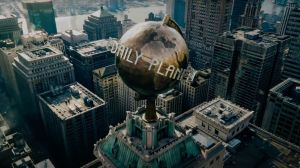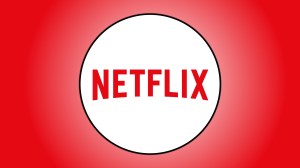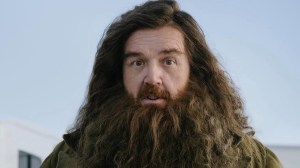
Pete’s Dragon is the Disney remake of the classic film of the same name of surrounds the adventures of an orphaned boy named Pete and his best friend Elliot, who just so happens to be a dragon.
Videos by ComicBook.com
David Lowery (Upstream Color, Empire Builder), is the director of Pete’s Dragon.
Lowery sat down with ComicBook.com in Los Angeles to talk about his move into family friendly movies and adapting a Disney classic.
How familiar were you with Pete’s Dragon before you signed on to direct and, stepping backward a bit, how did you get involved in the project?
David Lowery: I was as familiar as anyone might be if they had seen the movie roughly 28 years earlier. Maybe it wasn’t that much – maybe it was 24 years earlier? – and I hadn’t seen it since then. It was a movie I had seen as a kid and I liked it when I was a kid, but it wasn’t my favourite, so it, sort of, had gone onto that list of movies that I vaguely remembered, but not really. I was more a fan of Puff the Magic Dragon. That one was a really big one to me because my dad used to sing me that song a lot at bedtime and, so what happened was, I was editing my last film and my agent was sending me just open writing assignments at various studios just to see what I was interested in.
He was trying to figure out what my tastes were because he was pretty new to representing me and one of those was Pete’s Dragon and, if I recall correctly, the contents of that email were: Disney wants to remake Pete’s Dragon, but not remake it. They just want to use the title to tell a new story and want a new, fresh, original voice to tell that story and it can’t be a musical.
I read that email and my first thought I was thinking was Puff the Magic Dragon, so I responded with a joke about how I was excited to have a new opportunity to introduce a new generation of children to subtle marijuana innuendos and, then I remembered Pete’s Dragon was a Disney movie and I didn’t remember that much about it, but I did like the idea of taking a new approach and it having no sense of deference to the original because, I love children’s movies, I’ve always wanted to make one, I love fantasy films, I like movies about children and relationships with animals or creatures or anything that’s not human because there’s something very primal and special about that – tying all the way back to my own relationships with my pets as a kid and, so I just saw a lot of opportunity there and I responded and said, “Sure, we’ll be there.” We met with the producers and we just got along really well. We really liked each other’s sensibilities. The “we” I’m talking about is Toby Hallbrooks who wrote the movie with me and he’s produced everything I’ve ever done and, so we went a pitched a version of this movie to the studios and the thing I think really worked in our favour is that we weren’t expecting to get the job. It’s just so far out left field – especially with the movie we’d just made. This was right after Sundance 2013, so we just felt that this was a lark and we’d go make these connections at Disney and maybe it would pay off later on and it wouldn’t amount to anything and, so we went and made our pitch and the next day they called and said, “Great. You have the job, you’re writing it.” We were like, “Well, that happened. I guess we’re writing Pete’s Dragon now.”
That’s how it started and at that point it was just a writing job. At that point we just thought it was going to be a fun writing job and that it was something we weren’t going to have to make. We had never done that before. We were excited to do something with a studio because it’s always great to make those inroads, but that was going to be a process that lasted as long as it did. We thought we’d do a draft and probably either like it and have us do another one or say, “These guys are nuts.” and give it to somebody else.
There was never any preciousness about it. We never were trying desperately to please anybody. My goal from day one was to make a movie that – to write a script – I wanted it to be something I would have loved when I was seven years old and, then we went from there.
How did you directing the movie spin out of that?
Lowery: We’d spent a year working on the script. We went through a couple drafts and it was a great process because the very first draft we wrote was really long and was the version of the movie we thought Disney would want and the producers read it and they called us and they told us that they liked it and thought it was good and it was a little long – it was 140 pages – and they also said that the best part about it was the first 20 pages when it was just the kid and the dragon hanging out in the forest without any dialogue and they wondered if we would be interested in making the rest of the script feel like that?
When they said that a little lightbulb went off in my head and the realization was that they wanted us to make the movie that we wanted to make and that was great because we were kind of making the movie that we wanted to make, but we also were thinking that this was just a writing job and we were going to try and make Disney happy and try to predict what they were going to expect us to do.
The reaction to that was no. Don’t do what you think Disney wants you to do. Do what you want to do as storytellers and as filmmakers and, so that was the beginning of me directing the movie – even though I didn’t know it at the time. At the point, 20 minutes of the kid hanging out with the dragon in the woods without dialogue was the type of movie that I know how to make and the type of stuff that I’m interested in and to go more in that direction was very easy for me to do and a welcome change of pace and very exciting.
We kept doing multiple drafts and we kept working on it and after a year – almost a year to the day that we got the job – they asked me if I’d be interested in directing it?
I hadn’t thought about it before then, to be 100% honest, I had not thought that this was something that I was going to direct or that I wanted to direct, but the minute he asked me I realized that it was. It actually was something that I wanted to do and the story had become increasingly personal and it had become something I was very connected to and, in asking that question, I suddenly considered the possibility that someone else wanted to direct it and was horrified by that prospect and I had to do it myself and, so I went and met with the studio and talked about how I wanted to do it and, again, it was a situation where they called the next day and said, “Alright. Let’s go do it.” and three months later I was in New Zealand.
Can you talk about some of the unique challenges of having a feature castmember not be present on set?
Lowery: It’s not as hard when you’re shooting it. You give yourself little reminders like the tennis ball on a stick, so 20 feet up is where he’s going to be, so we have to make sure we’re back enough to frame for that. You figure that part out pretty quickly and I think that at this point we’ve all grown up with behind-the-scenes documentaries on dvds. You see how it’s done. It’s a pretty rudimentary process. There’s not any great technological process going on in terms of what is there when nothing’s there. There really is just literally nothing.
We built a big wireframe head that we put on a stick and used sometimes if we wanted to have Pete reaching up and petting something, but half the time, it was easier for them to do it without anything there.
When Natalie reaches up a pets Elliot for the first time she very skillfully reached up and pet the air in front of here. There’s nothing there.
The challenges really came in post production because CG effects are expensive, but at the same time, they’re a dime a dozen. Every movie has CG. You see really impressive stuff on HBO every Sunday involving dragons. It’s not as special as it used to be and, at the same time, everyone’s got different standards for visual effects and everyone’s got different ideas for what looks good and what does not and it’s a very fine line and when you start working on a movie like this you just assume everything is going to look great and you hire Weta to do the effects and it’s all going to look amazing and, then you start seeing the effects come through and they are amazing, but sometimes there’s something that’s just a little bit off and you can’t figure out what it is and learning how to describe what it is that feels off to you is really, really hard and really tricky and I learned that these visual effects company – as skilled as they are – they have to reinvent the wheel every movie because every director has a different perspective or a different sense of what they want and they have to adjust their skillset to that.
For me, the onus was on me to decide where my standards were, what I wanted to look at and learn how to see things a different way.
They’re going in there and lighting the dragon, they’re going in there and putting the atmosphere around and I’m trying to tie him into the photography and it’s tricky. They have to be cinematographers, they have to be production designers, they have to be make up artists. They have to be all that and it has to be up to the standards of the rest of the photography and when it’s not it’s no one’s fault because it’s such a crazy process and 50 people are working on one shot and you really have to learn how to see things in a new way. To see that, oh, the light that is highlighting Elliot’s fur on the left side of his head is a different colour light than is on Pete’s head that was really there on set and it’s a subtle shade off, but it’s off, and that’s why he’s not fitting into the scene as well and it’s a really tricky process to get yourself into the mindset of using your eyes that way.
—-
So what do you think ComicBook.com readers? Are you excited to see Pete’s Dragon realized on the big screen again? Let us know in the comments below.
Pete’s Dragon is in theaters everyone on August 12, 2016.









